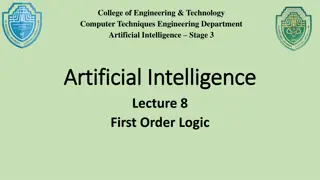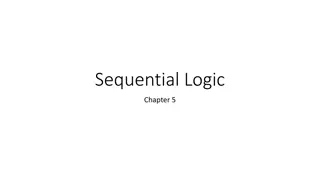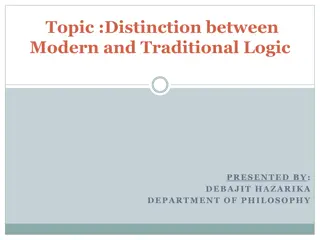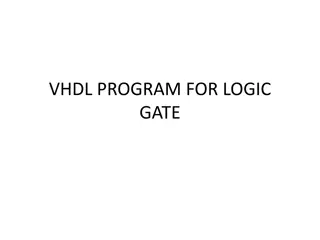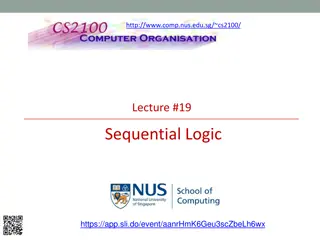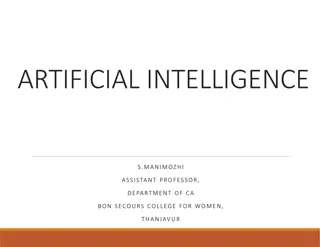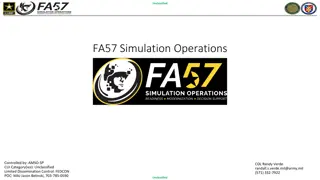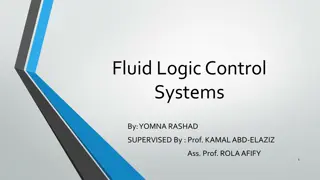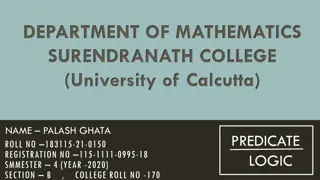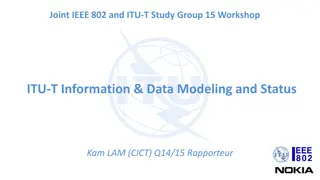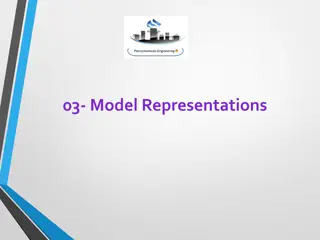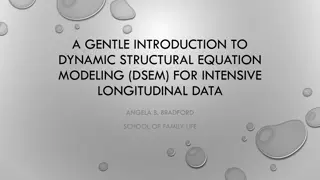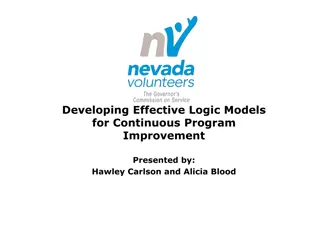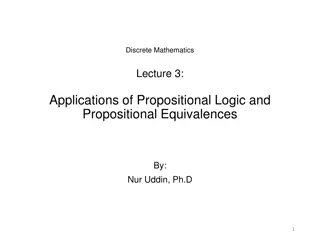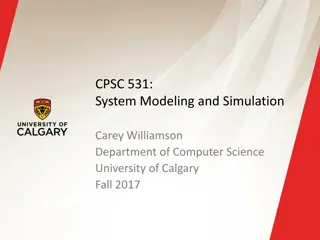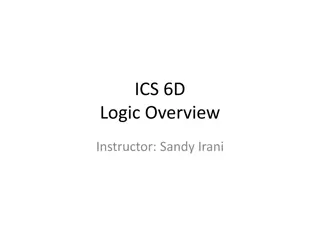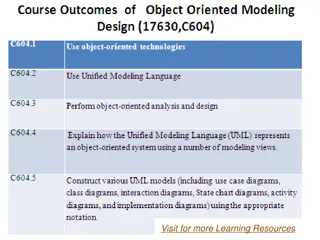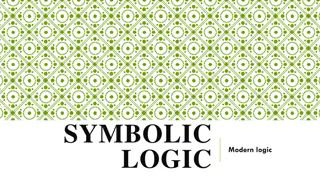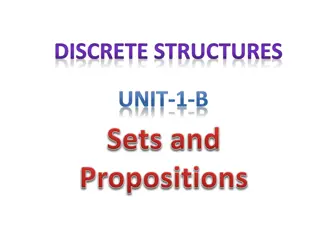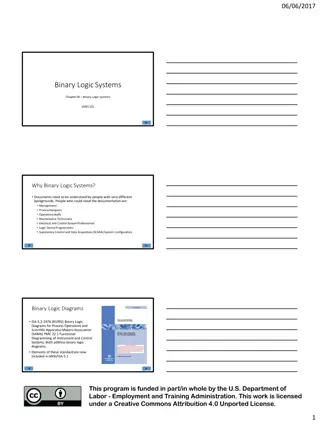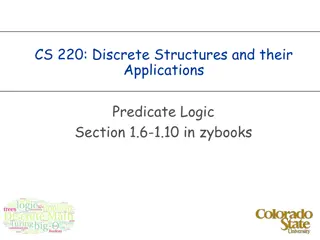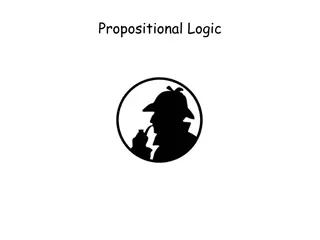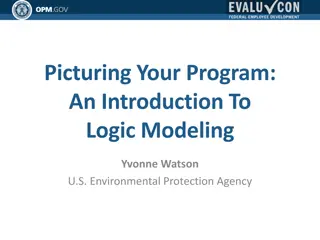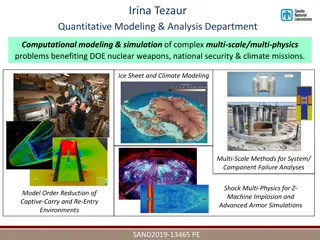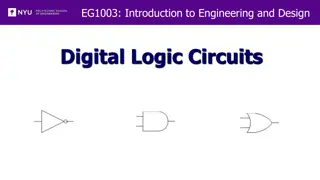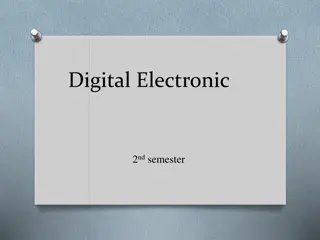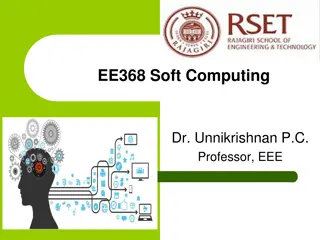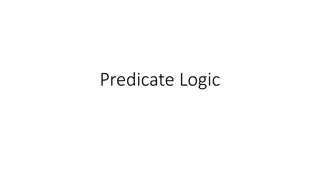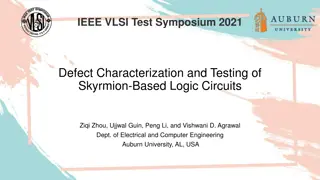Understanding First-Order Logic in Artificial Intelligence
Delve into the realm of first-order logic in artificial intelligence as a knowledge-based agent represents and deduces actions in its operating world. Explore the limitations of propositional logic and the expressive power of first-order logic, along with syntax, semantics, and models in logical lan
3 views • 27 slides
Understanding Sequential Logic Circuits in Digital Systems
Logic circuits in digital systems can be either combinational or sequential. Sequential circuits utilize storage elements along with logic gates, where outputs depend not only on present inputs but also on past inputs and internal states. They are essential building blocks, with storage registers pl
5 views • 20 slides
Topic : Distinction between Modern and Traditional Logic.
Logic, as a normative study, focuses on distinguishing correct reasoning from incorrect. Traditional logic, based on Aristotle's work, emphasized syllogistic reasoning, while modern logic, pioneered by figures like Leibnitz and Russell, employs mathematical methods and symbolic logic for a more adva
2 views • 10 slides
Logic Families
Logic families such as Diode Logic (DL), Resistor-Transistor Logic (RTL), and Diode-Transistor Logic (DTL) each have distinct capabilities and limitations when it comes to performing logic functions. While DL gates are simple and inexpensive but limited in functionality, RTL gates offer both normal
1 views • 22 slides
VHDL Logic Gate Programming Examples
This content provides VHDL code examples for various logic gates including AND, OR, NOT, XOR, and X-NOR gates along with their corresponding circuit diagrams. Each code snippet is accompanied by a brief explanation and a visual representation of the logic operation. The provided VHDL code can be uti
0 views • 7 slides
Understanding Sequential Logic in NUS CS2100 Lecture #19
Explore the concepts of sequential logic in Lecture #19 by Aaron Tan at NUS, covering memory elements, latches, flip-flops, asynchronous inputs, synchronous sequential circuits, and different types of sequential circuits. Delve into the distinction between combinatorial and sequential circuits, memo
3 views • 26 slides
Understanding Predicate Logic in Artificial Intelligence
In the world of artificial intelligence, predicate logic plays a crucial role in representing simple facts. It involves syntax, semantics, and inference procedures to determine the truth value of statements. Real-world facts are represented using propositions in logic, allowing for structured knowle
1 views • 19 slides
Overview of Army Modeling and Simulation Office
The U.S. Army Modeling and Simulation Office (AMSO) serves as the lead activity in developing strategy and policy for the Army Modeling and Simulation Enterprise. It focuses on effective governance, resource management, coordination across various community areas, and training the Army Analysis, Mod
1 views • 8 slides
Introduction to Fluid Logic Control Systems
Fluid logic control systems utilize devices that switch fluid, like air, between outlets, providing ON/OFF outputs swiftly based on control signals. This article explores moving-part logic devices, control functions, Boolean algebra applications in control technology, and advantages of fluid logic s
1 views • 22 slides
Understanding Logic Circuits in Aircraft Systems
Aircraft logic systems follow MIL/ANSI standard logic symbols and conventions used in electronic applications. Inverters, buffers, AND gates, OR gates, NAND gates, NOR gates, Exclusive-OR gates, and Exclusive-NOR gates are commonly used in aircraft logic circuits. These gates have specific behaviors
0 views • 52 slides
Introduction to Predicate Logic in Mathematics
Predicate logic is a powerful tool used in mathematics to express complex relationships and assertions that cannot be adequately represented by propositional logic. It allows for the quantification of statements over a range of elements using predicates and quantifiers like universal and existential
1 views • 13 slides
Evolution of Modeling Methodologies in Telecommunication Standards
Workshop on joint efforts between IEEE 802 and ITU-T Study Group 15 focused on information modeling, data modeling, and system control in the realm of transport systems and equipment. The mandate covers technology architecture, function management, and modeling methodologies like UML to YANG generat
1 views • 16 slides
Understanding Geometric Modeling in CAD
Geometric modeling in computer-aided design (CAD) is crucially done in three key ways: wireframe modeling, surface modeling, and solid modeling. Wireframe modeling represents objects by their edges, whereas surface modeling uses surfaces, vertices, and edges to construct components like a box. Each
1 views • 37 slides
Introduction to Dynamic Structural Equation Modeling for Intensive Longitudinal Data
Dynamic Structural Equation Modeling (DSEM) is a powerful analytical tool used to analyze intensive longitudinal data, combining multilevel modeling, time series modeling, structural equation modeling, and time-varying effects modeling. By modeling correlations and changes over time at both individu
0 views • 22 slides
Developing Effective Logic Models for Continuous Program Improvement
Explore the essentials of logic models and their significance in evaluating programs for continuous improvement, presented by Hawley Carlson and Alicia Blood. Learn about theory of change, logic model components, and using logic models for evaluation planning.
4 views • 12 slides
Applications and Equivalences in Propositional Logic
This lecture explores applications of propositional logic, including translating sentences, system specifications, logic puzzles, and logic circuits. It also defines tautology, contradiction, and contingency as types of compound propositions, along with logical equivalences. Examples and illustratio
0 views • 16 slides
System Modeling and Simulation Overview
This content provides insights into CPSC 531: System Modeling and Simulation course, covering topics such as performance evaluation, simulation modeling, and terminology in system modeling. It emphasizes the importance of developing simulation programs, advantages of simulation, and key concepts lik
0 views • 28 slides
Understanding Logic in Mathematics and Computer Science
Logic is a branch of mathematics that deals with true or false values. It is essential for fields like computer science, aiding in AI, automated reasoning, and digital logic design. Propositions, logical operations like conjunction and disjunction, and the use of propositional variables are fundamen
0 views • 28 slides
Understanding Object Modeling in Software Development
Object modeling is a crucial concept in software development, capturing the static structure of a system by depicting objects, their relationships, attributes, and operations. This modeling method aids in demonstrating systems to stakeholders and promotes a deeper understanding of real-world entitie
1 views • 65 slides
Understanding Propositional Logic and Logical Operators
Learn about propositional logic, statements, logic operators, compound statements, exclusive-or, logical equivalence, and writing logical formulas for truth tables. Explore how to create compound statements for exclusive-or using different approaches and ensure logical equivalence. Enhance your know
0 views • 26 slides
Coupled Ocean-Atmosphere Modeling on Icosahedral Grids
Coupled ocean-atmosphere modeling on horizontally icosahedral and vertically hybrid-isentropic/isopycnic grids is a cutting-edge approach to modeling climate variability. The design goals aim to achieve a global domain with no grid mismatch at the ocean-atmosphere interface, with key indicators such
1 views • 21 slides
Understanding Symbolic Logic: A Modern Approach
Delve into the world of symbolic logic where traditional and modern approaches differ. Learn how symbolic languages help overcome challenges with natural languages, leading to a clearer understanding of deductive reasoning through the analysis of premises, conclusions, compound statements, and logic
1 views • 32 slides
Understanding Propositional Logic at Kwame Nkrumah University
Dive into the world of symbolic logic and compound statements with a focus on Propositional Logic at Kwame Nkrumah University in Ghana. Explore the concepts of connectives, simple and compound statements, truth values, and more. Enhance your logical reasoning skills through a tutorial on symbolic lo
0 views • 57 slides
Understanding Propositional Logic and Mathematical Logic in Computer Science
Study the development of formal logic in computer science, focusing on propositional logic and mathematical logic. Learn about propositions, logical operators, and ways of combining statements to derive conclusions. Explore examples and understand how to determine the validity of arguments using log
0 views • 38 slides
Satisfiability Modulo Abstraction for Separation Logic with Linked Lists
This study explores the application of satisfiability modulo abstraction in separation logic with linked lists. It presents a technique using abstract interpretation concepts to handle separation logic formulas beyond previous methods, specifically focusing on over-approximating heaps that satisfy t
0 views • 41 slides
Understanding Binary Logic Systems in Documentation
Binary logic systems play a crucial role in documentation for individuals with diverse backgrounds such as management, process designers, operations staff, maintenance technicians, and more. These systems, depicted in binary logic diagrams, provide a clear and concise representation for various prof
4 views • 16 slides
Understanding Predicate Logic: From Propositional to Predicate Logic
Transitioning from propositional to predicate logic allows reasoning about statements with variables without assigning specific values to them. Predicates are logical statements dependent on variables, with truth values based on those variables. Explore domains, truth values, and practical applicati
0 views • 34 slides
Understanding Propositional Logic Concepts
Explore different facets of propositional logic, including conditional statements, logic operators, logical equivalence, contrapositives, and proofs. Delve into the intricacies of if-then statements, logical negations, and the nuances of if, only-if conditions. Enhance your understanding of proposit
0 views • 25 slides
Introduction to Symbolic Logic: Understanding Logical Inferences
Logic is the study of reasoning methods to distinguish between correct and incorrect arguments. Symbolic Logic involves representing logic symbolically for easier understanding and manipulation. Logical inferences help in making decisions based on reasoning chains. The content discusses the use of l
1 views • 28 slides
Understanding Logic Modeling for Effective Program Development
Explore the fundamentals of logic modeling through "Picturing Your Program: An Introduction to Logic Modeling" by Yvonne Watson from the U.S. Environmental Protection Agency. Discover the purpose, components, and benefits of logic models in program planning, design, communication, implementation, an
1 views • 36 slides
Advancing Computational Modeling for National Security and Climate Missions
Irina Tezaur leads the Quantitative Modeling & Analysis Department, focusing on computational modeling and simulation of complex multi-scale, multi-physics problems. Her work benefits DOE nuclear weapons, national security, and climate missions. By employing innovative techniques like model order re
0 views • 6 slides
UBU Performance Oversight Engagement Framework Overview
Providing an overview of the UBU Logic Model within the UBU Performance Oversight Engagement Framework, this session covers topics such as what a logic model is, best practice principles, getting started, components of the logic model, evidence & monitoring components, and next steps. The framework
0 views • 33 slides
Understanding Digital Logic Circuits and Design Principles
Explore the world of digital logic circuits with a focus on logic gates, truth tables, boolean equations, and Karnaugh maps. Learn how to design combinational logic circuits, analyze different logic functions, and solve sample problems related to digital logic. Get hands-on experience with LabVIEW a
0 views • 28 slides
Introduction to Digital Electronic Circuits and Logic Gates
Understanding digital electronic circuits and logic gates is essential for building digital systems. This content covers the basics of logic gates, digital signals, and the practical application of binary digits in circuits. It discusses the function and importance of logic gates, such as NOT gates
0 views • 17 slides
NetLogo - Programmable Modeling Environment for Simulating Natural and Social Phenomena
NetLogo is a powerful and versatile programmable modeling environment created by Uri Wilensky in 1999. It allows users to simulate natural and social phenomena by giving instructions to multiple agents operating independently, making it ideal for modeling complex systems evolving over time. NetLogo
0 views • 7 slides
Introduction to Logical Thinking: Science of Correct Reasoning
Logic, the science of correct reasoning, explores ways to infer conclusions from assumptions and validate arguments. This course introduces logic as a tool for analyzing arguments, automating processes, and enhancing communication clarity. Through classic logic variants like propositional and predic
0 views • 30 slides
Applications of Fuzzy Logic in Soft Computing
Fuzzy logic is primarily used as the underlying logic system for decision support systems in various applications. From fuzzy controllers to fuzzy rule bases, this technology enables approximate reasoning similar to human decision-making processes. Explore the architecture and major components of Fu
0 views • 27 slides
Understanding Predicate Logic and Quantifiers
Predicate logic extends propositional logic by allowing statements to be assigned specific values. The limitations of propositional logic are overcome through predicate logic, where statements like "?. is greater than 3" have subject and predicate parts denoted as ?(?). Furthermore, predicates can b
1 views • 20 slides
Understanding First-Order Logic Fundamentals
Explore the limitations of propositional logic and delve into the syntax, semantics, and inference rules of first-order logic. Learn about predicates, quantification, and how to express relationships among objects using predicates. Enhance your understanding of how first-order logic provides a more
0 views • 42 slides
Defect Characterization and Testing of Skyrmion-Based Logic Circuits at IEEE VLSI Test Symposium 2021
With CMOS devices nearing quantum-mechanical limits, magnetic skyrmions offer a promising solution for next-generation spintronic logic devices and memories. This presentation at the IEEE VLSI Test Symposium 2021 delves into defect characterization and testing of skyrmion-based logic circuits. It co
0 views • 19 slides
